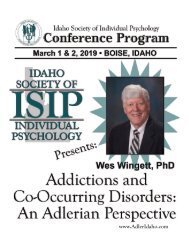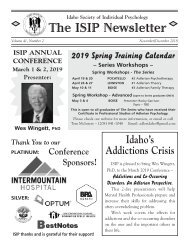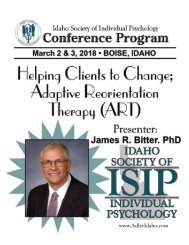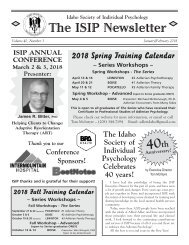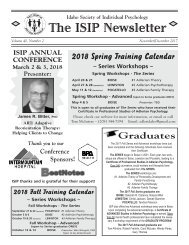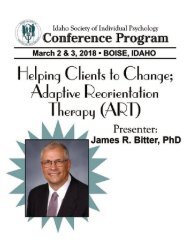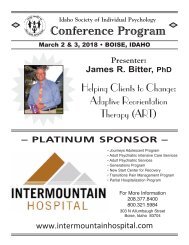May Newsletter 2020
Create successful ePaper yourself
Turn your PDF publications into a flip-book with our unique Google optimized e-Paper software.
2020 Spring Training Calendar
- Series Workshops -
Spring Workshops - The Series
Unfortunately we had to cancel the spring
workshops for 2020 due to the Coronavirus.
Advanced Spring Workshop
We have moved the spring workshop to online learning!
Visit our website for more information.
This is open to all graduates of The Series who have received their
Certificate in Professional Studies of Adlerian Psychology.
Please check our website for more information, or email or call
Edward Mowry – (208) 761-2921 Email: adleridaho@gmail.com
2
The 1st of 9 Principles of Adlerian Psychology ~Wes Wingett
People are social beings seeking ways to connect and
contribute in families, schools, and communities.
People are social beings who want to contribute and belong first in a family,
then in an educational setting, and then in the larger community.
Alfred Adler was born on the outskirts of Vienna, Austria in 1870.
His father was a grain merchant, his mother did not work outside the family
home that eventually included seven children, and Alfred was the second
child and the second son. Adler’s experiences and his theory were impacted
by some events within his family of origin. When Adler was four years of
age his brother Rudolf died in the same room where they both slept. Adler’s
family was impacted by an economy characterized by many peaks and
valleys and times of economic insecurity. Adler’s family was a Jewish family
in a predominantly non-Jewish area.
Alfred Adler has been considered to be one of the first social
psychologists. His theory and practice centered on understanding and
empowering democratic leadership in three social arenas, the family, the
school, and the community. Democratic leadership would be characterized as environments embracing the
idea of freedom with order in families, schools, and communities. Democratic leadership would be contrasted
with autocratic leadership characterized as order without freedom and anarchy characterized by freedom
without order.
In addition, Adler believed that at birth humans entered a family seeking connection and needed help
from others to evolve into socially responsible individuals. Eventually each individual in the family would
contribute to the good of the family. This tradition of helping others hopefully would continue in schools and
communities.
After finishing medical school Adler wrote his first publication focusing on a social problem, that is,
the working conditions of tailors. In 1895 Adler identified a social problem, described the social problem, and
created possible solutions to treat that specific problem.
After his fourth tour of duty in the military, Adler returned to Vienna in 1919 and began working with parents,
teachers, and students in child guidance centers in Vienna. The movement toward learning democratic
principles in families and schools were introduced in post-World War I Vienna. Families that had been
impacted by war characterized Vienna. Families were affected by the death and injuries of loved ones, families
were affected by division and displacement. Some families were living in poverty. Adler and his associates
began working with Viennese families and their teachers.
Adler and his colleagues worked together to encourage and empower personal and social
understanding and responsibility in families and schools. In the early 1930’s 33 child guidance clinics had been
established in Vienna.
Adler’s work in communities continued after his completion of medical school, the writing of his first
paper, and the opening of a medical practice that was located near the circus in Vienna where people with a
variety of issues sought his help.
Adler’s influence and his socially forward thinking have influenced families and schools through family
and teacher education. His influence in the community has impacted psychiatric hospitals and psychiatric day
care centers, all Twelve Step programs, and positive and productive work place relationships.
Adler’s theoretical emphasis on equality, education, encouragement, empathy, creative problem solving, and
personal and social responsibility has positively influenced families, schools, and communities.
Encouragement is in order
Ted Warstadt
Current worldwide concern related to Covid
19 has contributed to considerable anxiety, fear,
confusion and conflict. Many individuals have lost SO
much. They have lost loved ones, lost employment and
peace of mind.
Maintaining a healthy perspective during
challenging times is not an easy task. Adding to that
is the fact that we have been medically prescribed
social isolation due to safety issues. We are in a unique
situation where we have been asked to limit our face
to face social interaction – the incredible fertilizer for
growing the produce of encouragement.
So many are struggling to solve problems
related economy, mental health and safety. At this time
in our world history it may be helpful to remember
that there have been, there are, and there ALWAYS
will be those whose life experience has served as
examples of inspiration and encouragement to others.
There are many examples of those who have offered
encouragement in the course of human history; one is
Alfred Adler.
Alfred Adler dedicated his life and career
to promoting encouragement. He did this while
seeing through the eyes of equality and love. Adler
actually referred to his approach to psychology as a
“method of limitless encouragement”. This is quite
a statement when considering the challenges that
he experienced throughout his childhood and adult
life. His promotion of encouragement came despite
his own numerous challenges. He himself overcame
considerable obstacles. At the age of four he witnessed
the death of a sibling due to pneumonia. Rickets
prevented him from walking until he was four years
old. At age five he nearly died of pneumonia. He had
poor eyesight and was nearly ran over by a car on two
occasions. In short, Adler struggled significantly in his
formative years. He was a sickly child who struggled
in school. One of his teachers suggested to his parents
that he become an apprentice to a shoemaker.
This was the man who indicated that the chief
danger in life is that people take too many precautions.
Through his tenacity, kindness and optimism, Alfred
Adler has given the world a rich history of intellectual
and philosophical depth with his contribution to
human services -- Individual Psychology.
Adler’s encouraging approach to emotional
wellness involves a process of unoffensively allowing
the individual to question his or her own beliefs.
This is done in a gently guiding manner. He helped
others to look beyond the restrictive, limiting lenses
of personal perception and embrace new vistas. His
approach allows individuals to look at their behavioral
problems as mistakes and to then develop the freedom
the see more favorable potentialities and outcomes.
Adler summarized his approach to mental wellness
with this: “In Individual Psychology, during its mild
barrage of questions, the erring person experiences
grace, redemption, and forgiveness by becoming a
part of the whole”. Many individuals over the past
century have benefitted from Adler’s encouraging
approach to emotional wellness. Many have felt peace
and wholeness as the result of experiencing healing
through Individual Psychology.
In returning to the current matter at hand
– the challenges posed by a worldwide pandemic.
These challenges are real. There are various competing
ideas on how the individual, the family, the state,
nations and the world should approach this difficult
challenge. Perhaps, however, it would do us well to
dig into the positive experiences of humanity and
look to encourage and to
be encouraged—to help
others and be helped by
others. We would do well
to develop an interest in
the interest of others. All
others.
We know that
infirmity, injustice,
trauma and tragedy may
appear to hinder one
person’s development,
Ted Warstadt
3
while another may seem to travel an unobstructed
path toward the attainment of his or her goals. It
is not needful, however, to compare our perceived
personal misfortunes or advantages to those of others.
Looking for superiority or inferiority in interpersonal
comparisons, in short, is competitive in nature and
may reap very narrow, constricting, self-assuming
and socially disconnected emotional results – and
at the expense of the peace that is experienced by
seeing through the eyes of equality. After all we have
an opportunity to see that we are literally “all in
this together”. It could be beneficial for us to seek to
improve our abilities while engaged in constructive
involvement with our fellow beings. Additionally,
while recognizing that life will inevitably place before
each of us a variety of unexpected obstacles, we can
receive some reassurance in recognizing this truth: the
mere presence of even the most severe and extreme
forms of adversity can never eliminate the opportunity
for individual personal growth and development.
Ironically, we frequently find that the most significant
personal accomplishments occur amid life’s most
difficult and undesirable challenges. Such was the case
of Alfred Adler - our encouraging pioneer in Positive
Psychology.
THE ISIP 2020
BOARD OF DIRECTORS
President- Dave Webster
President Elect - Ric Boyce
Secretary - Karen Dietz
Past President - Raissa Miller
Treasurer - Julene Coston
Historian - David Teed
Member-at-Large - Rodney Dotson
Member-at-Large - Staci Cooper
Member-at-Large - Brandon Clark
Member-at-Large - Charity Potter
Executive Director - Edward Mowry
Stay Tuned!
The ISIP Board has been working to find the best way to offer trainings during this trying time.
We are still hoping to offer training opportunities this fall as well as the conference in spring
of 2021. Please continue to check the website at www.AdlerIdaho.org to keep up to date with
adlerian training opportunities here in Idaho!
4







